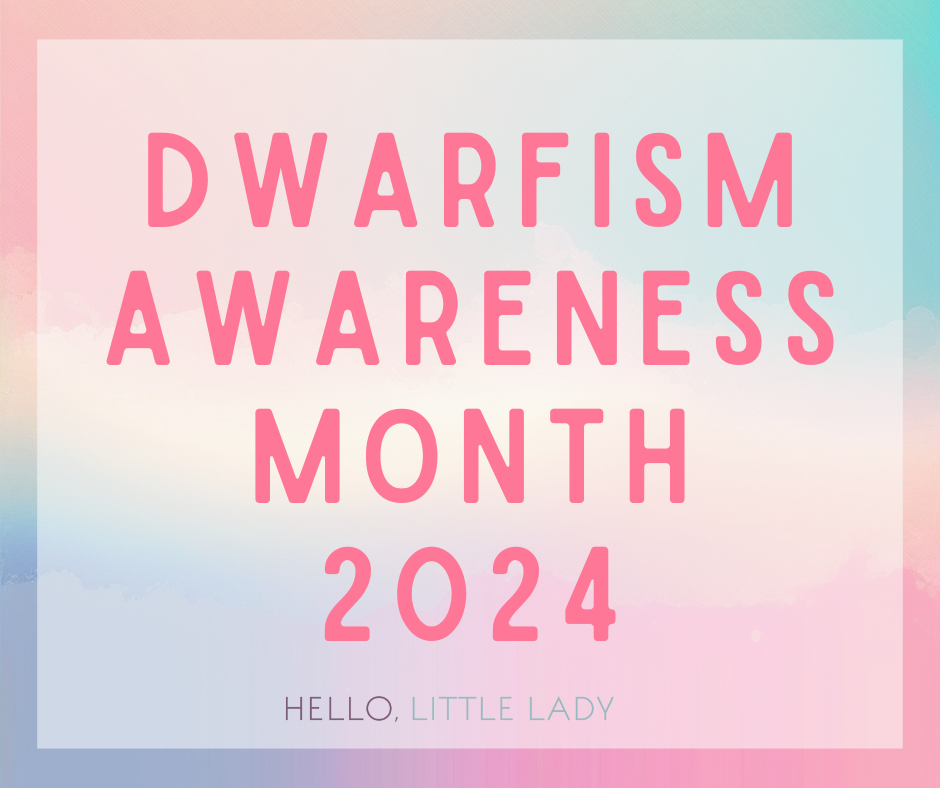This post is also available to read on the HelloLittleLady SubStack Account.
October is a popular month for awareness raising, but this particular one is close to my heart.
Dwarfism Awareness Month in October seeks to raise awareness of the challenges of what life is like when you live with one of the over 200 forms this disability has.
Those of us who live life under 4ft 8” face prejudice, ignorance and discrimination for how we were born. Whether that is being laughed at, stared at, and pointed at (or more horrifically) filmed in the street, facing challenges to access education and work, or manoeuvring around a world designed for people over 5 feet.
Often, we are told, “You’re just little”, our lived experiences dismissed or people are horrified that we face daily micro and, at times, full-on aggression as people find our very existence humourous or a way to exert their physical or social dominance.
Awareness Raising Beginnings
My blog, HelloLittleLady.com, was initially set up in 2008 to write about the challenges and, frankly, at times, absurd conversations I encounter from average-heighters. I wrote anonymously to start with – to give myself space to write freely about experiences and process the trauma I faced – and because of the political climate I found myself experiencing with the Dwarfism community in the U.K. itself.
I finally came out of the blogging closet in 2016, and some people were surprised to discover that the person behind these tomes wasn’t someone with Achondroplasia, the most common form of dwarfism.
From there, my creative practice and activism evolved to where it is today, centred around my experience with a rare form of proportionate dwarfism called Russell Silver Syndrome. For the curious, I stand at 4ft 4” (approx 133cm) tall.
I’ve spent a good portion of my life trying to tell people why people with Dwarfism aren’t ‘just little’ or why the word ‘midget’ is an insult – whether it is written across a t-shirt or in a book or spoken by a comedian. Or the daily challenges that we face. Only to see another Facebook post about how someone with Dwarfism has either been verbally or physically (or both) assaulted on the street or requires protection to access education, for example.
Struggling with Awareness Raising
Over the years, I’ve struggled with the need for an awareness-raising month to inform people how to treat us with respect and dignity. From the start of my blog, I actively refused to do ‘inspiration-porn’ pieces for magazines. I fought to find and make creative work that empowers my voice rather than being a passive subject for others’ curiosity – whether well-meaning or not.
There are many good people out there doing this well for the Dwarfism community – and I urge you to find out more about them (links provided at the end of this post).
Creativity as a vehicle for Awareness Raising
One of the things that I have been ruminating on over the past few years is how awareness-raising can be more of a form of creative activism or expression.
Too often, awareness-raising seems to be a one-way passive conversation. It involves educating and raising awareness of the change that needs to be undertaken so that particular sections of society can gain more understanding and acceptance.
To put it bluntly, it feels like speaking into an echo chamber, and I’ve recently begun to wonder how effective such activity is (again, this is not said with the intention to minimise the efforts of those who are very good campaigners). I suspect this has more to do with my age, feeling burnt out, and being cynical about whether real change for how we are treated will ever be possible for the Dwarfism community. I’m tired of trading on my trauma to gain access to space, place and resources.
However, maybe this cynicism is more about evolving my observations on the landscape in which we find ourselves seeking wider societal acceptance. Or put more succinctly – each generation has its warriors. I’ve done that part, and now I look forward, battle-weary at how such activity can and, I feel, must change. Such thoughts are rooted in that ever-present feeling as a disabled person for the need for independence and agency – or to be able to carve a life out on our terms.
Meaning – what if awareness-raising months were used to empower communities through the use of creativity? How, you may wonder?
Equip communities with opportunities to celebrate their identities.
Through mentorship, funding and opportunities from the wider arts and cultural sector. Platforming voices and lived experiences help develop community discourse and identity, and if anyone on the outside learns something from such activity, all the better. But there is no pressure to perform for the consumption of others.
Awareness-raising would become less passive, not just regurgitating the same facts and figures or feeling like you’re talking to the wind.
A new starting point for engagement?
As we go into another Dwarfism Awareness Month, I guess my point is, is this a chance to rethink the purpose and take stock of who the awareness raising really benefits?
Can we instead focus on and celebrate the voices that make up our rich community? Can we start new conversations about what we want to campaign for in terms of our own safety and respect in society? What would that look like, and how would we know when we’ve got there?
For those reading from the Dwarfism community – what are your thoughts on the awareness-raising month? If you’re a bystander – how could you lend your skills and expertise?
Organisations doing fab Dwarfism awareness raising all year around:

